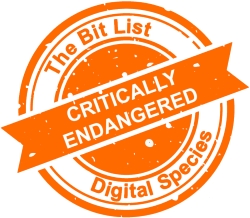Smartphone Gaming
|
|
 |
|
|
Smartphone gaming includes all games that were designed to be played on mobile devices such as smartphones or tablets. It is an example of contemporary digital culture but is often considered less important than other games. Many require community engagement for a game to function, similar to Massively Multiplayer Online (MMO) Gaming. |
||
|
Trend for 2023:
|
Consensus Decision |
|
|
Added to List: 2021 |
Trend for 2024:
|
|
|
Imminence of Action Action is recommended within three years, detailed assessment in one year. |
Significance and Impact The loss of tools, data or services within this group would impact on a large group of people and sectors. |
Effort to Preserve | Inevitability It would require a major effort to prevent or reduce losses in this group, including the development of new preservation tools or techniques. |
|
Examples Pokémon GO, Candy Crush, FG/O, Clash of Clans, Angry Birds |
||
|
‘Practically Extinct’ in the Presence of Aggravating Conditions Lack of skills, commitment or policy from corporate owners; uncertainty over IPR or the presence of orphaned works; short term contracts; lack of skills, commitment or policy from corporate owners; rapid churn of OS and updates; shifting business requirements of app resellers; dependence on exotic or obsolete formats or OS processes; loss of underlying code or gaming engine; limited or no commercial interest; dependency on remote servers that are closed; limited recognition of value of game play; over-dependence on goodwill of ad-hoc community. |
||
|
‘Endangered’ in the Presence of Good Practice IPR supportive of preservation; strong documentation; version control for code and compiled app; source code; emulation pathway; trusted designated repository or community taking preservation responsibility and capacity to deliver; inclusion by agencies that collect games on other platforms. |
||
|
2023 Review This was a new entry submitted through the 2021 open nomination process. There are overlaps between this entry and others relating to both Gaming and Smartphone Apps. The 2021 Jury recruited additional expertise for a recommendation on which category it better fits and agreed with the expert recommendation to assign the Gaming category but keep as a separate entry to emphasize that smartphone gaming shares preservation issues with video games that are exacerbated by issues unique to smartphones. The 2023 Council agreed with keeping smartphone gaming as a separate entry but added two new entries to complement this one, Console games and PC games. |
||
|
2024 Interim Review These risks remain on the same basis as before, with no significant trend towards even greater or reduced risk (‘No change’ to trend). |
||
|
Additional Comments Smartphone games such as Pokémon GO, etc. have large active communities of players and fandoms. The argument is that in relation to gaming, mobile gaming does not have the same community of support for DP as well as a higher impact given that smartphone games have a wider general audience amongst demographics that may not play PC or Console games due to the increased accessibility of mobile games as well as the more “casual” nature of the games. It is worth noting here that the Emerging Formats project from the British Library (working with the UK legal deposit libraries), is focused on the collection of three format types; eBook mobile apps, web-based interactive narratives and structured data. The enhanced curation method detailed in Florence Smith Nicholls and Giulia Carla Rossi’s report Collecting complex digital publications: testing an enhanced curation method has potential to be applied to the broader topic of smartphone games. Case Studies or Examples:
See also:
|
||





































































































































